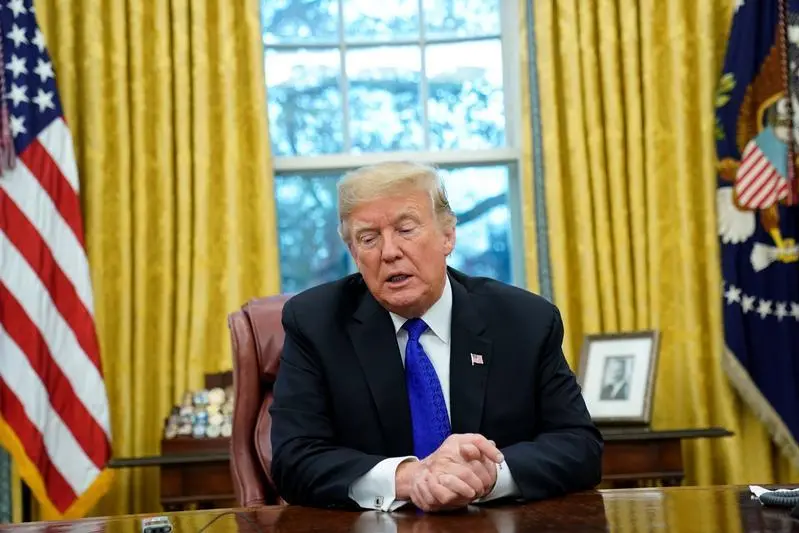PHOTO
LONDON/DALLAS - Even by his own standards, Donald Trump has been contradictory on oil. The U.S. president spent much of 2018 berating the Organization of the Petroleum Exporting Countries for keeping crude prices high by undersupplying the market. At the same time, he exacerbated the problem by reinstating export sanctions on Iran. An early December cut by OPEC and fellow producers including Russia is an irritant, but relatively low prices still look attainable.
On current projections, the reduction of 1.2 million barrels per day removes much of a potential glut caused by epic pumping by Saudi Arabia, Russia and the United States. Combining the International Energy Agency’s forecasts for oil demand in 2019 and its estimate for non-OPEC supply, the oil-producing bloc only needs to pump 31.6 million bpd to balance the market – 1.4 million below its November output.
Given Trump’s targeting of Iran’s 3 million bpd of production, the reduction by OPEC and its peers is unhelpful. At worst, the combination could leave supply too tight, pushing prices up again.
Yet there are reasons the president can hope for a more favourable outcome. Demand growth could undercut IEA expectations – Wood Mackenzie estimates an increase of just 1.1 million bpd for 2019 while U.S crude production is seen jumping to 12 million bpd, up from 9.4 million in 2017. Most powerfully of all, Trump has greater scope to tell Saudi’s Crown Prince Mohammed bin Salman what to do.
The White House gave MbS a pass in November on whether he was involved in the murder of Saudi journalist Jamal Khashoggi. The president could use this leverage to call for an end to the 18-month-old blockade of Qatar or even of the war in Yemen, which the Brookings Institution says costs Saudi $50 billion annually.
But the most obvious power play involves oil, where Trump could insist MbS resist future OPEC cuts. That would make any potential squeeze temporary, and allow Trump scope to enforce sanctions against Tehran.
The fly in the ointment is the U.S. Congress, which could yet override Trump and punish MbS and Saudi. To keep prices low as a 2020 election nears, that may necessitate keeping Iranian crude flowing by renewing waivers allowing big importers to continue buying. That would make Trump look inconsistent – although that’s not something that appears to bother him.
CONTEXT NEWS
- After starting the year at $67 a barrel, Brent crude prices rose to $86 in early October, before falling below $60 a barrel at the end of November. As of Dec. 14 they were trading at $61.16 a barrel.
- The U.S. Senate delivered a rare double-rebuke to President Donald Trump on Saudi Arabia, Reuters reported on Dec. 13, voting to end U.S. military support for the war in Yemen and blame the Saudi crown prince for the murder of journalist Jamal Khashoggi.
- The votes were largely symbolic because to become law the resolutions would have to pass the House of Representatives, whose Republican leaders have blocked any legislation intended to rebuke the Saudis.
- Oil prices jumped more than 5 percent on Dec. 7 when the Organization of the Petroleum Exporting Countries and allies including Russia agreed to reduce output by 1.2 million barrels per day. The cuts were based off October output levels.
- Iran gave OPEC the green light on Dec. 7 to reduce oil output by around 0.8 million barrels per day from 2019, after finding a compromise with rival Saudi Arabia over a possible exemption from the cuts, an OPEC source told Reuters.
- A Russian Energy Ministry source told Reuters that Moscow was ready to contribute a cut of around 200,000 bpd, and sources said other non-OPEC producers could contribute a further 200,000 bpd of output cuts, bringing an overall cut to 1.2 million bpd.
- OPEC and non-OPEC producers will review the cuts in April.
- A Reuters survey of 38 economists and analysts published on Nov. 30 forecast Brent crude to average $74.50 a barrel in 2019.
(Editing by Rob Cox and Bob Cervi) ((george.hay@thomsonreuters.com; Reuters Messaging: george.hay.thomsonreuters.com@reuters.net Lauren.SilvaLaughlin@thomsonreuters.com; Reuters Messaging: Lauren.SilvaLaughlin.thomsonreuters.com@reuters.net))





















